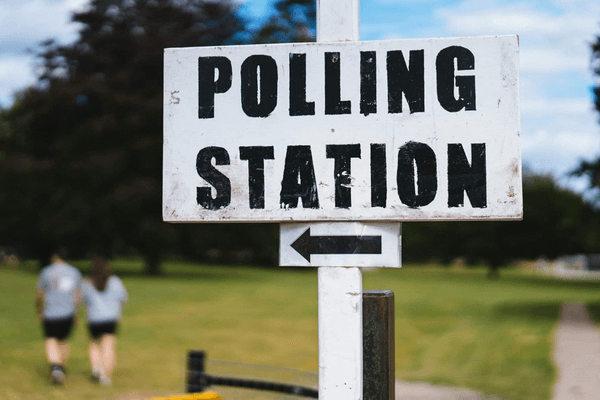
Share
Federal elections barely affect Australian property prices. Domain research shows 0.2% difference between parties. Focus on fundamentals, not politics.
Every federal election cycle, the same question emerges across dinner tables and real estate offices: should I wait until after the election to buy or sell property? Picture Sarah, a 28-year-old teacher from Melbourne, who has been saving for her first home for three years. With the deposit finally ready and pre-approval secured, she hesitates as election day approaches, wondering if she should wait to see which party wins before making her move. This widely held belief suggests that political outcomes significantly influence property market performance, causing many Australians like Sarah to put their property decisions on hold during election periods. However, new research from Domain challenges this conventional wisdom, revealing that federal elections have far less impact on Australia’s property market than most people believe.
After analysing data from the past seven federal elections, the findings suggest that neither major political party holds a significant advantage in boosting property market growth, and the factors that truly drive property performance operate largely independently of electoral outcomes. For prospective buyers and sellers, particularly first-time homebuyers, understanding these insights could mean the difference between making informed property decisions and missing opportunities based on political misconceptions.
The numbers behind the election myth
Domain’s comprehensive analysis of seven federal elections provides compelling evidence that challenges long-standing assumptions about political influence on property markets. The research examined property performance under both Liberal and Labor governments, measuring house and unit price growth across different political terms.
The results reveal surprisingly modest differences between the major parties. Liberal governments oversaw slightly better house price growth at 3.1 per cent compared to Labor’s 2.9 per cent – a difference so marginal it falls within statistical noise. Interestingly, the pattern reverses for unit prices, where Labor governments recorded stronger growth at 4.5 per cent versus 1.4 per cent under Liberal leadership.
Dr Nicola Powell, Domain’s Chief of Research and Economics, emphasises that these variations don’t indicate superior property market management by either party. “The property market is shaped by forces beyond politics,” Dr Powell explains. “While elections can affect policy and sentiment, the reality is far more complex than our long-held beliefs suggest.”
These findings suggest that voters choosing between parties based on expected property market performance may be focussing on the wrong factors. The data indicates that broader economic conditions, interest rate movements, and supply-demand dynamics play far more significant roles in determining property outcomes than the political party in power.
The surprising truth about election day auctions
One of the most intriguing discoveries in Domain’s research relates to auction performance on election days themselves. Conventional wisdom suggests that sellers should avoid scheduling auctions on election days, with auction volumes typically dropping by 50 per cent as sellers anticipate lower attendance and reduced buyer interest.
However, the data reveals a counterintuitive reality: auctions held on election days actually achieve higher clearance rates than those conducted on surrounding weekends. Election day auctions recorded an average clearance rate of 60.4 per cent, outperforming both the Saturday before elections (59.5 per cent) and the Saturday after (59.8 per cent).
This unexpected finding suggests that election day might represent an opportunity rather than a disadvantage for motivated sellers. With fewer properties competing for buyer attention and potentially less vendor competition, serious sellers could benefit from the reduced auction volumes.
The higher clearance rates may result from several factors: buyers who attend election day auctions are likely more committed and less influenced by the political calendar, vendors who proceed with auctions despite conventional wisdom may be more motivated to sell, and reduced competition could create a more favourable environment for successful sales. For first-time buyers like Sarah, this could mean facing less competition and potentially securing a property at a more reasonable price.
How political uncertainty really impacts property sales
While individual elections may have minimal impact on property markets, prolonged political uncertainty presents a different challenge. Domain’s modelling reveals that political uncertainty can measurably affect property transaction volumes, though the relationship is more nuanced than simple election timing.
The research shows that even a one-point increase in political uncertainty can result in a decline of 8.08 property sales. While this might seem modest for individual transactions, extended periods of uncertainty can accumulate into thousands of lost transactions across the market.
Importantly, the data distinguishes between short-term electoral events and sustained uncertainty periods. Brief election campaigns typically don’t significantly disrupt buying behaviour, as most property purchases involve months of planning and consideration that extend beyond election cycles.
However, prolonged periods of political instability – such as leadership changes, hung parliaments, or extended policy debates – can create more substantial market impacts. During these periods, both buyers and sellers may adopt a “wait and see” approach, temporarily reducing market activity until greater clarity emerges. This distinction is crucial for understanding when political events genuinely warrant caution versus when they’re simply background noise.
First home buyers and government policies
While overall property market performance shows minimal difference between political parties, first home buyers represent one segment where government policies do create measurable variations. Domain’s research identified notable differences in first home buyer activity under different governments.
Labor governments recorded higher first home owner-occupier loans at 34.4 per cent compared to 30.5 per cent during Liberal terms. This difference likely reflects varying policy approaches to first home buyer assistance, including grants, stamp duty concessions, and shared equity schemes that different parties prioritise.
However, first-time buyers should recognise that these variations represent policy differences rather than fundamental market performance advantages. The higher first home buyer activity under Labor governments may result from more generous assistance schemes, but this doesn’t necessarily translate to better overall market conditions or superior long-term investment outcomes.
For first-time buyers, understanding these policy differences can inform timing decisions around government transitions, but shouldn’t overshadow more fundamental considerations like personal financial readiness, market affordability, and long-term housing needs. Sarah’s situation exemplifies this perfectly – her savings, employment stability, and local market conditions matter far more than which party wins the election. For sophisticated investors, SMSF property strategies offer long-term advantages regardless of political cycles.
What really drives Australia’s property market
Understanding the limited impact of federal elections becomes clearer when examining the factors that genuinely drive property market performance. Unlike political cycles, these fundamental drivers operate continuously and exert far greater influence on property values and market activity.
Interest rates represent perhaps the most significant factor affecting property markets. Reserve Bank of Australia monetary policy decisions directly influence borrowing costs, affecting both buyer purchasing power and investor returns. A single interest rate change can have immediate and lasting effects that dwarf any political party’s policy influence.
Supply and demand dynamics form another crucial driver, influenced by population growth, migration patterns, housing construction rates, and land release policies. These factors often span multiple political terms and reflect long-term demographic and economic trends rather than electoral outcomes.
Economic conditions including employment levels, wage growth, and consumer confidence create the foundation for property market activity. These macroeconomic factors respond to global conditions, business cycles, and structural economic changes that operate independently of domestic political leadership.
Local factors such as infrastructure development, zoning changes, and regional economic growth patterns also significantly impact property values, often determined by state and local government decisions rather than federal political parties. A new train line or shopping centre development can transform local property values regardless of who sits in Canberra. Practical advice for property buyers and sellers
Given the research findings, property buyers and sellers can approach their decisions with greater confidence, focussing on personal circumstances and market fundamentals rather than electoral timing. This shift in perspective can help avoid missed opportunities and unnecessary delays.
For buyers, the key considerations should include personal financial readiness, including stable employment, adequate deposit savings, and comfortable servicing capacity for desired loan amounts. Market conditions such as local supply levels, price trends, and interest rate expectations provide more valuable guidance than election calendars.
Sellers should focus on their own circumstances, including whether their housing needs have changed, their financial position, and current market conditions in their specific area. The research suggests that motivated sellers shouldn’t avoid election periods, particularly given the potential advantages of reduced competition.
First-time buyers particularly benefit from this perspective, as waiting for “perfect” political conditions could mean missing years of market participation. For someone like Sarah, the months spent waiting for electoral clarity could see property prices rise faster than her savings grow, ultimately making homeownership less affordable rather than more secure.
Domain’s analysis of seven federal elections provides compelling evidence that political timing has minimal impact on Australia’s property market performance. With house price growth differing by just 0.2 per cent between Liberal and Labor governments, and even election day auctions outperforming surrounding weekends, the research challenges fundamental assumptions about politics and property.
For prospective buyers and sellers, particularly first-time homebuyers like Sarah, these findings offer liberating clarity.Before making major property decisions, couples should have essential conversations about finances and goals to ensure alignment. Rather than timing decisions around electoral cycles, success comes from focussing on personal financial readiness, understanding local market conditions, and recognising the fundamental drivers that truly influence property values: interest rates, supply and demand, economic conditions, and individual circumstances. The property market’s resilience during electoral periods, combined with higher auction clearance rates on election days themselves, suggests that motivated participants shouldn’t let political calendars dictate their decisions. Instead, the evidence supports a more pragmatic approach: when your personal circumstances align with favourable market conditions, proceed with confidence regardless of which party occupies the parliamentary benches. Working with experienced mortgage brokers can help navigate market conditions regardless of political climate.
Further questions
Should I delay buying property until after the election?
Do property prices perform better under Liberal or Labor governments?
Why do auction clearance rates increase on election days?
How does political uncertainty affect property sales?
What factors should first-time buyers prioritise over election outcomes?
This is general information only and is subject to change at any given time. Your complete financial situation will need to be assessed before acceptance of any proposal or product.





